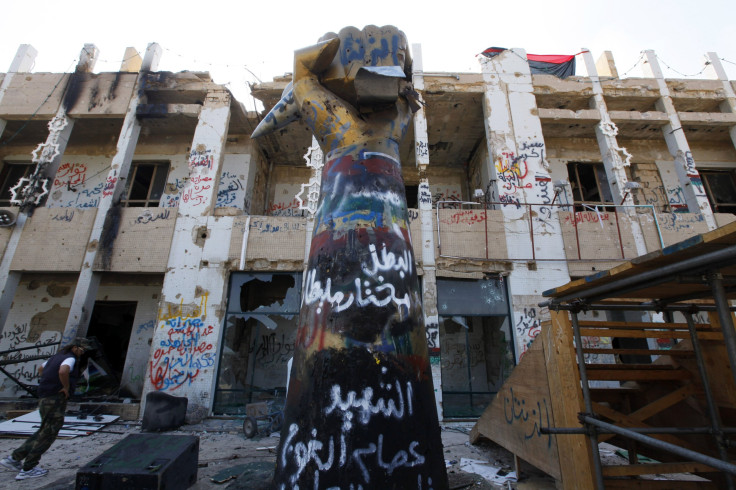Gaddafi Compound Bab al-Aziziya To Be Transformed Into Amusement Park

They say irony is the best policy, which makes Libya’s plan to turn Muammar Gaddafi's restricted Tripoli compound into an amusement park and green space for the people all the more enticing.
Gaddafi’s vast 6-square-kilometer (2.3-square mile) complex of Bab al-Aziziya, or “Splendid Gate,” was a city within a city where he orchestrated his government during a 42-year reign, which ended with his death at the hands of rebels in his hometown of Sirte in October 2011. The compound once housed several lavish villas, offices, gardens and Gaddafi’s beloved Bedouin tents, as well as a swimming pool, sports pitches and a series of underground tunnels.
Many residents driving by the compound, located on prime real estate in central Tripoli, said they were harassed simply for looking at it under Gaddafi’s iron-fisted rule. Now, it will belong to them.
“This space will be transformed into a green area and an amusement park as a place of entertainment for Libyan families,” Tourism Minister Ikram Basha Imam announced at a press conference on Tuesday, according to local reports. “The work to clear away the rubble from the ruins of Bab al-Aziziya, which was a black spot in Tripoli and a source of concerns for residents, has begun.”
Though the compound was heavily fortified, it was virtually destroyed by NATO air raids and a rebel assault that reached the Libyan capital in August 2011 and ousted Gaddafi from power. The site was then plundered by the rebels and subsequently occupied by squatters. Imam announced that the department of social services was in the process of identifying and re-housing the homeless families who now call the area home.
Initial plans for the compound, announced last year by interim Prime Minister Abdelrahim al-Keeb, called for a library, theater and monument to martyrs of the conflict. That project was later abandoned in favor of a public park for the masses. The government has reportedly contracted eight private companies to build it, with construction to begin in two month’s time.
Last month, Imam enlisted the help of the U.N. World Tourism Organization to implement an action plan to rebuild Libya’s beleaguered tourism sector as a way to increase national revenue, create employment and foster national cohesion.
“Achieving sustainable tourism is a propeller to create employment, diversify Libya’s national sources of income and promote our image as an attractive tourism destination domestically and abroad,” she said during a workshop on technical cooperation in Tripoli. “Revitalizing domestic tourism will likewise help foster national cohesion in this significant period of nationwide rebuilding.”
“Libya is a prime setting for tourism development, being blessed with natural, cultural and archaeological assets, including five Unesco World Heritage Sites,” Unwto Secretary-General Taleb Rifai added. “Tourism is the right vehicle to contribute to the international repositioning of Libya whilst contributing to its sustainable economic development and job creation, particularly among the youth.”
The proposed park in the former Gaddafi compound is seen as one of the first steps in the greater plan. But a Euromonitor International report on travel and tourism in Libya, released this month, noted that the country’s recovery is expected to be “slow and bumpy.”
“War-torn Libya is trying to engage in a smooth transition which is proving immensely challenging given the deep divisions that still plague the country, and the continued sporadic eruptions of violence,” the report found. “The assassination of the U.S. ambassador to the country in 2011, followed by the bombing of the French Embassy in 2012 have left Libya far from being stable and capable of standing back on its feet. The majority of tourists in the last two years of the review period were representatives of media companies, journalists, and staff of aid organizations.”
© Copyright IBTimes 2024. All rights reserved.






















